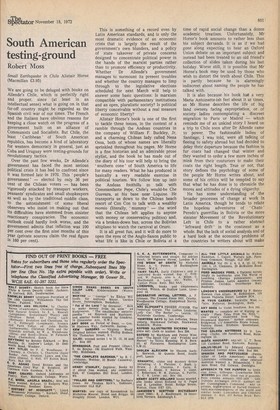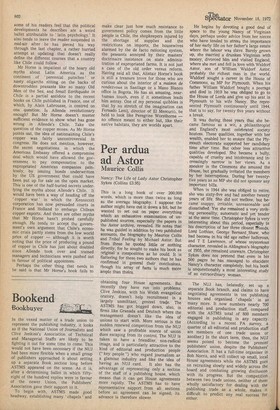South American testing-ground
Robert Moss
Small Earthquake in Chile Alistair Horne (Macmillan £3.95) We are going to be deluged with books on Allende's Chile, which is perfectly right and proper, since (at least in an intellectual sense) what is going on in that far-off country might be regarded as the Spanish civil war of our times. The French and the Italians have obvious reasons for keeping a close watch on the progress of a government built on an alliance of Communists and Socialists. But Chile, the least 'Caribbean ' of South American republics, has become a kind of laboratory for western democracy in general, just as Cuba and Uruguay were testing-grounds for revolutionary tactics.
Over the past few weeks, Dr Allende's government has faced the most serious Political crisis it has had to confront since it was formed late in 1970. T'his ' people's government ' — elected by only 36 per cent of the Chilean voters — has been Vigorously attacked by transport workers, Peasants' syndicates and small shopkeepers as well as by the traditional middle class, to the astonishment of some liberal observers who insist on making out that its difficulties have stemmed from sinister reactionary conspiracies. The economic outlook could hardly look worse, and the government admits that inflation was 100 per cent over the first nine months of this Year (private sources claim the real figure IS 160 per cent). This is something of a record even by Latin American standards, and is only the most dramatic evidence of an economic crisis that is largely the result of the government's own blunders, and a policy of state takeover of private concerns designed to concentrate political power in the hands of the marxist parties rather than to promote efficiency or productivity. Whether Dr Allende's government manages to surmount its present troubles and whether the country manages to limp through to the legislative elections scheduled for next March will help to answer some basic questions: Is marxism compatible with parliamentary institutions and an open, pluralistic society? Is political liberty conceivable without a real measure of economic liberty?
Alistair Home's book is one of the first to tackle these issues, in the context of a ramble through the Andean countries in the company of William F. Buckley, Jr, and a charming Chilean lady called Nena Ossa, both of whose names are liberally sprinkled throughout his pages. Mr Home is a fine historian and an admirable prose stylist, and the book he has made out of the diary of his tour will help to bring the southern cone' of South America to life for many readers. What he has produced is basically a very readable exercise in political tourism. We follow him up into the Andean foothills to talk with Command'ante Pepe, Chile's would-be Che Guevara, at his base near Liquine. He transports us down to the Chilean beach resort of Con Con to talk with a wealthy rnomio (literally, 'mummy' — the word that the Chilean left applies to anyone with money or conservative politics) and, via a broken-down bus, across the Bolivian altiplano to watch the carnival at Oruro.
It is all great fun, and it will do more to open the eyes of the Anglo-Saxon public to what life is like in Chile or Bolivia at a time of rapid social change than a dozen academic treatises. Unfortunately, Mr Home's book amounts to rather less than his subject demands. It is as if we had gone along expecting to hear an Oxford Union debate on an important subject and instead had been treated to an old friend's collection of slides taken during his last holiday. Worse still, it is possible that Mr Home's book may be used by those who wish to distort the truth about Chile. This is partly because he is alarmingly indiscreet about naming the people he has talked with.
It is also because his book hat a very Marie Antoinette-ish feel about it at times, as Mr Home describes the life of big land owners facing expropriation, or of society ladies contemplating a discreet migration to Paris or Madrid L— which reminds me of an unkind story I heard on a trip to Chile soon after Dr Allende came to power. The fashionable ladies of Santiago, I was told, were all talking of fleeing to safety abroad but had decided to delay their departure because the fashion in fur coats had changed that winter and they wanted to order a few more inches of mink from their couturiers to make their coats the right length. True or not, that story defines the psychology of some of the people Mr Home writes about, and some of his critics will be tempted to say that what he has done is to chronicle the mores and attitudes of a dying oligarchy.
He has some understanding of the broader processes of change at work in Latin America, though he tends to relate the hopeless adventures of ' Chato ' Peredo's guerrillas in Bolivia or the more sinister Movement of the Revolutionary Left in Chile to a rather abstract ' leftward drift ' in the continent as a whole. But the lack of social analysis and of a hard look at the economic problems of the countries he writers about will make some of his readers feel that the political developments he describes are a weird ballet attributable to ' latin psychology.' It also tends to leave the reader suspended in mid-air after he has pieced his way through the last chapter, a rather hurried attempt at updating that doesn't really define the different courses that a country like Chile could follow.
Mr Home is impatient of the hoary old myths about Latin America as the continent of ' perennial putsches ' or nasty oligarchs sitting on the backs of downtrodden peasants like so many Old Men of the Sea, and Small Earthquake in Chile is a partial antidote to the recent books on Chile published in France, one of which, by Alain Labrousse, is centred on one question: Is Allende revolutionary enough? But Mr Home doesn't muster sufficient evidence to show what has gone wrong in Allende's Chile. Take the question of the copper mines. A$ Mr Home points out, the idea of nationaliSing Chile's copper was fairly uncontroversial in congress. He does not mention, however, the secret negotiations in which the American Embassy offered a compromise deal which would have allowed the government to pay compensation to the expropriated American companies painlessly, by issuing bonds underwritten by the US government that could have been put up for sale on the open market. This is one of the half-buried secrets underlying the myths about Allende's Chile. It would have been a way of heading off the ' copper war' in which the Kennecott corporation has now persuaded courts in France and Holland to embargo Chilean copper exports. And there are other myths that Mr Horne hasn't probed carefully enough. He tends to accept the government's own argument that Chile's economic crisis partly stems from the low world price of copper — although it is worth noting that the price of producing a pound of copper in Chile has just about doubled since Allende took over and trained managers and technicians were pushed out in favour of political appointees.
Perhaps the other thing that needs to be said is that Mr Home's book fails to make clear just how much resistance to government policy comes from the little people in Chile, the shopkeepers injured by the shortage of supplies and the restrictions on imports, the housewives alarmed by the de facto rationing system, the peasants annoyed by their masters' doctrinaire insistence on state administration of expropriated farms. It is not just a case of the old order versus reform. Having said all that, Alistair Home's book is still a treasure trove for those who are curious about the interior of a maison de rendezvous in Santiage or a Mano Blanco office in Bogota. He has an amusing, nearhuman touch, even if it sometimes leads him astray. One of my personal quibbles is that by no stretch of the imagination can Fernado Lenij, director of El Mencurio, be held to look like Peregrine Worsthorne — no offence meant to either but, like their native habitats, they are worlds apart.



















































 Previous page
Previous page